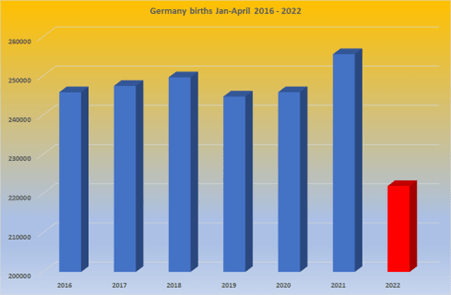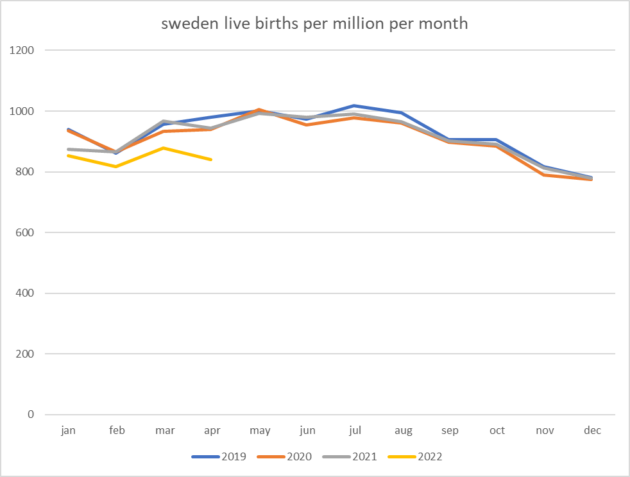New Zealand Doctors Speaking Out With Science
nzdsos.com
Many countries have reported a dramatic fall in the numbers of babies being born in the first 3 to 4 months of 2022. Here are a few examples.
Germany – figures are available for January to April. If we compare the number of births to the same time period from 2016 to 2022 we see this:

In 2022 there is an 11% drop from average of the last 6 years of births in January to April. That is very unusual – statistically there is a 1 in 12.5 billion chance of this occurring by chance. Why has this happened?
Figures from other countries show a similar trend.
Taiwan – births in April were 23% lower that April 2021.
United Kingdom – births in February were 10% lower than in February last year.
Hungary – different areas of Hungary have different vaccination rates. A comparison of birth rates from January to March 2022 between the 5 most vaccinated and 5 least vaccinated counties shows that the most vaccinated had a fall in births of 15.2% compared to a fall of only 4.7% in the counties with the lowest vaccination rates.
What could be causing the fall in fertility in 2022?
Many people think it is the result of lockdowns – maybe financial issues have meant that people decided to put off having children?
Sweden did not lockdown and its economy suffered least compared to other European countries. But a steady fall in births for the first four months of 2022 compared to 2021 shows decreases of 2.4% in January, 5.6% in February, 9.3% in March and 11.0% in April.

Is there any evidence that COVID-19 vaccinations could stop couples from getting pregnant?
Yes, there is a measurable effect on men’s sperm and there are changes in women’s periods which could result in problems getting pregnant.
COVID-19 vaccinations reduce sperm counts for 6 months after two injections
Scientists in Israel looked at the effect of two doses of Pfizer vaccine on the sperm of men who are sperm donors. Now these sperm donors have to pass a lot of tests to be sure their sperm is top quality. Samples of sperm before and after their two doses of the Pfizer vaccine were compared. Three months after their second dose sperm numbers were reduced by 15%, which means 1.2 million fewer sperm in each ml. And the sperm that were present were 22% less likely to move normally which means they are less likely to be able to fertilize an egg.
Sperm counts and movement mostly came back to normal by 6 months after the second vaccine dose. The problem is that most countries have now added a third and a fourth dose of vaccine between 3 to 6 months after the previous shot. We have no idea how this affects sperm numbers and quality.
Did Pfizer test the effect of their vaccine on sperm? The answer according to Dr Byram Bridle, a vaccine expert, is that they didn’t. Pfizer used rat studies to say there was no effect on fertility. But they only gave the vaccine to the female rats and not to the males who impregnated them.
And there’s another important finding from Pfizer’s rat studies. Weren’t we told the mRNA in the vaccine stays in the muscle of the arm and antibodies are made there and only they spread around the body? Well, it seems that is not the case. Pfizer’s rat studies showed that the mRNA in its special coating of lipid (fats) got into the blood stream and spreads almost everywhere in the rat’s body, including to the testicles and the ovaries.
Very few studies have looked at mRNA in the blood stream after vaccination in people. One study found mRNA in the blood of 71% of breastfeeding mothers between 3 and 7 days after vaccination. Another found vaccine mRNA in the blood one day after vaccination in 85%, another found maximal concentrations one day after injection which reduced to undetectable levels by 10 days. Others have reported that vaccine mRNA remains in the circulation for at least 15 days.
COVID-19 vaccinations can cause period problems
Soon after the COVID vaccinations were introduced women began to complain of a change in their periods and cycle length – the number of days from one period to the next. A change in cycle length could indicate that ovulation (release of an egg) did not occur that month. Initially, experts dismissed these reports saying that there was no way by which the vaccines could affect periods. Some even said it was just a result of stress.
Eventually, there were calls to investigate this further. So far two studies have been published. In July a web-based survey of women’s experiences reported that 42% had heavier bleeding after vaccination but did not report on whether cycle length was changed. A study from Israel found 37% of women reported a change in their periods and 23% specifically had changes in cycle length (shorter cycles or longer cycle or no periods) which had not resolved by 3 months in a third of cases. Another study which has yet to be published reported that after the Pfizer injections 29% reported delayed periods and 24% shorter cycles.
So, there is now good evidence that changes in periods and cycle length do occur after COVID19 vaccination. We still don’t have a lot of information about if and how many women stop producing an egg every month and how long this lasts for. And we need to work out why these changes happen.
How could COVID-19 vaccinations cause period problems?
Some believe that vaccines cause a number of changes in the immune system and possibly these changes affect the lining of the womb and cause changes in bleeding. Maybe having the vaccine is stressful to some women as we know that stress can affect periods. Or perhaps it could be due to changes in the hormones (FSH and LH) which are released from the brain and affect the ovaries.
Another cause that has to be considered is a possible direct effect of the mRNA in the vaccine on the ovaries. We already know that mRNA gets into the bloodstream after the injections in people. The Pfizer rat studies showed that mRNA can be found in the ovaries. The mRNA in the vaccine also gets into the brain which might affect release of the brain hormones involved in regular ovulation. Despite these vaccines being available since the beginning of 2021 no one has done a study in people to see how much mRNA gets into the bloodstream, where it goes to and how long it stays for.
Do COVID-19 vaccinations cause an increase in miscarriages?
An increase in the numbers of women having miscarriages might also explain a fall in birth rates. There are concerns that COVID-19 vaccines might increase the miscarriage rate. Pfizer produced only one study of 42 rats to support their view that their COVID-19 vaccine was safe in pregnancy. Half got the vaccine and half didn’t.
There are a few issues with the study design – for example, the experiment ended before the rats gave birth. The other problem is that both the virus and the vaccine spike bind strongly to human cells but only weakly to rat cells. Rats don’t actually get COVID-19 disease when exposed to the virus. So what happens in rats is not a good example of what might happen in humans.
The Pfizer trial of the COVID-19 vaccine specifically said that pregnant women should not be part of the study. But accidentally 270 pregnant women were recruited and vaccinated. In documents held by the FDA (Federal Drug Authority in America) but only released in May 2022 Pfizer wrote that they did not know the outcome of 238 of the pregnancies but reported an outcome for the other 32. Only one ended in a normal delivery of a live baby. The rest had miscarriages (23), stillbirths (2), babies who died after delivery (4), or the outcome was still awaited (5).
Another cause of concern was a study reported in April of 2021 by the CDC (Centre for Disease Control) in America. The CDC had a Register of women who became pregnant soon after vaccination or who were vaccinated during pregnancy. They reported that 104 miscarriages occurred between 6 weeks and 20 weeks of pregnancy in the 827 women being followed up (12.6% miscarriage rate) which was in the normal range for miscarriages for that time of pregnancy.
Unfortunately, they made an error in their calculations because 700 of the 827 women were vaccinated in the last 3 months of pregnancy so could not have had a miscarriage before 20 weeks. So was the miscarriage rate 104/127 (82%)? After this was pointed out they issued a corrected version of that part of the paper in October 2021 in which they did not calculate a miscarriage rate. They also released another report in October of the 2456 women who were by then in their Registry. They said that the miscarriage rates seen in vaccinated women between 6 weeks and 20 weeks were no different to the expected range of miscarriages at that state of pregnancy.
Since then there have been a number studies of miscarriage rates with COVID-19 vaccines. For example reports from Sweden and Switzerland studied about 1000 vaccinated women each and reported no difference in miscarriage rates compared to unvaccinated women. Another larger study from America found that women with miscarriages were not more likely to have been exposed to the vaccines. Other smaller studies with similar conclusions have been published. Pregnant women in Australia and New Zealand are strongly advised to avail themselves of COVID-19 vaccines and boosters.
Nevertheless, some obstetricians remain concerned about the effect of vaccines on fertility, and during pregnancy. Highly respected American obstetrician Dr James Thorp specialises in pregnancy disorders in the mother and developing fetus. In his busy practice he sees over 6000 women with high-risk pregnancies each year. He has published his concerns about the vaccines and spoken at international conferences. NZDSOS has previously reviewed his work here. A 7 minute summary of a recent interview with Dr Thorp can be found here.

